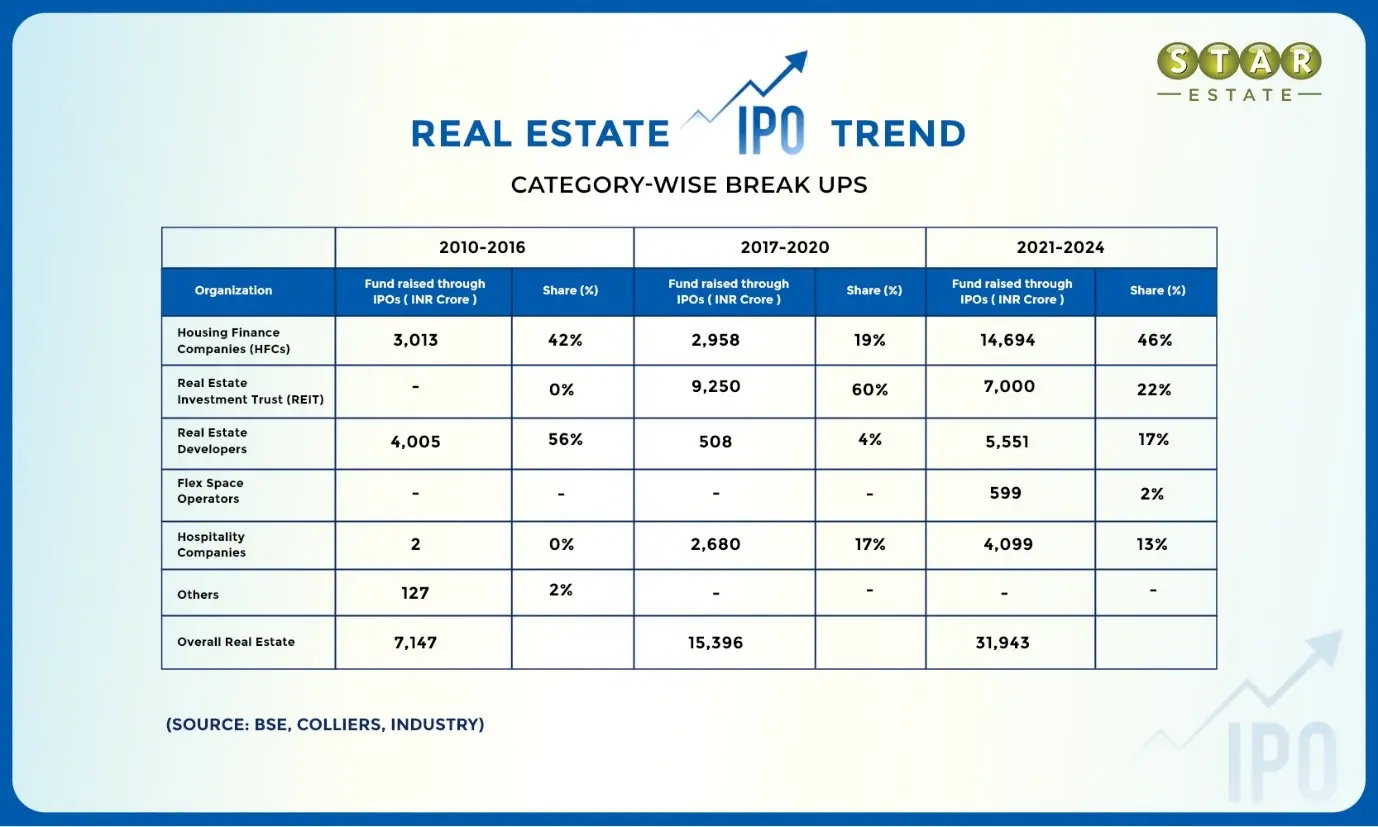Real Estate IPOs in India – A Bright Future Ahead for Investors
IP0, or initial public offering, anchors real estate market growth in India. The clear guidelines, economic reforms, and political stability led to the rise of real estate IPOs in India to Rs. 40,000 Crore since 2021. This transformation derives robust growth of non-liquid assets against other investment options. The growth trajectory continues to scale up in 2025, as seven initial public offerings (IPOs) recorded business of Rs. 7,600 crore.
 Real Estate IPOs in India – A Bright Future Ahead for Investors
Real Estate IPOs in India – A Bright Future Ahead for Investors Despite the chase to attain the industry tag, Indian real estate is making strategic moves to ensure stability and transparency in business. While trying to cement a non-linear operational process, developers also choose IPOs to build a robust financial pipeline. In the first instance, real estate investor sentiment remained apprehensive about the initial public offering. Like, are real estate IPOs in India worth investing in? Is it safe to invest in real estate companies IPO? Here is all you need to know.
The year 2010 rang the opening bell for real estate IPOs in India, but the trend gained momentum gradually.
However, tables started turning certainly for India’s second-largest employer post 2016. Along with how to invest in real estate companies IPOs and how it will reap returns remains a question.
An answer for the same is an alteration in investors’ beliefs based on clear guidelines and stringent rules that regulate the entire process.
What is Real Estate IPOs in India – The Explainer
IPOs, or initial public offering, is a way for a privately owned company to offer its shares on the listed stock exchange boards. Like NSE (National Stock Exchange) and BSE (Bombay Stock Exchange), via which the investors, including retail ones and distinguished entities, can invest in the company.
Why Real Estate Companies IPO remain the best real estate investment options in India in 2025
The Indian real estate trends in 2025 are the reflection of years of struggle and strategies that laid a strong foundation for initial public offering (IPOs). Unlike other industries, where the amount raised from IPOs can straightforwardly go into expansion plans.

Rather, the corpus built by offering shares is gradually put to work. The property market works at a calm pace, but with a high magnitude of liquidity. Where a hefty amount is borrowed, construction takes its due time, and then comes the selling part. Interestingly, unlike earlier, selling is not a one-time task; rather, it is now a phase-wise activity.
You May Also Like: Fractional Ownership Explained – A Rising Investment Toolkit in Indian Real Estate
Things to Remember about real estate IPOs in India
Wealth creation
The property market is about creating sturdy concrete structures with maximum potential to reap profitability. Irrespective of monthly rental, lease value, or capital gains, it is all about offering a legacy in exchange for monetary value.
Capital Sensitive Market
High cash inflow is the nature of the business; hence, the real estate companies IPOs are used to lower debt. The reason for opening an initial public offering is to create funds availability for paying off liabilities. Also, the secondary reason to initiate an IPO is fundraising to back new launches.
Regional Growth Varies
Indian real estate is a giant sector and is prone to local preferences. Hence, real estate companies in India attract a different set of investors. It includes HNI (high-net-worth Individuals), NRIs (Non-Resident Indians), and institutional investors. A certain percentage is allocated for retail investors; this allocation depends upon the value size of real estate IPOs in India.
The Indian property market witnessed a setback during 2014 and 2015. According to Colliers, 47 real estate IPOs in India by distinguished real estate companies have raised INR 300 billion since 2010. The major financial push to the sector has been witnessed in the past few years.
The possibility of a stock exchange-like investment option makes things go north for investors and developers. Importantly, bank credit to the Indian property market has witnessed a twofold increase in the last four years.
Going by the news report published in Business Standard, the real estate market now holds a 19.4% share of total bank lending. It shows a robust growth in business from 2016, when the same rate stood at 13.8%. This massive jump showcases strong and positive real estate investors’ sentiment. Specifically, the year 2024 witnessed a hurricane of real estate IPOs, which led to higher housing sales.

Step-by-Step Guide on How to Apply for Real Estate IPOs in India
Step 1
Open a Demat Account & Trading Account
Explore various financial investment platforms like GROW, ZERODHA, and ANGEL ONE, to name a few.
Step 2
Link the Platform
Connect the platform via your bank’s UPI for transaction purposes.
Step 3
Choose an IPO
Explore the listed real estate IPOs and choose from them according to the price band and lot size that suits your investment budget.
Step 4
Wait for Allotment
Your fund will be locked till the allotment process for real estate IPOs is complete. The invested amount will be debited from your account only if you receive an allotment.
Step 5
Check allotment & Demat Account
After locking a certain corpus, keep a track of the allotment process, as allotment for your share will reflect in the Demat & Trading account.
You May Also Like: Real Estate Investment – A Road Map to Retirement Planning
Benefits of investing in real estate IPOs in India
The initial public offering (IPO) in India has collateral benefits for investors and companies. If you wonder how investors can gain profit from real estate companies IPOs, then here ‘early bird offer’ is the hint.
An IPO means an initial offer made by any company at a minimum price brand considering its current market value, before getting listed on the stock exchange. Thus, an early investment creates an opportunity to reap high value in the future.
Brand Equity
Investing in a reputable company renders ownership to investors, and its business expansion leads to a high return on investment.
Liquidity
Once bought at a lower price band, investors can sell them at a higher value after the opening of the IPO in the stock market. Thus, one of the biggest advantages of investing in real estate IPOs in India is high liquidity gain without a waiting period.
Lower Debt Risk
According to SEBI guidelines, companies can raise 20% funds by raising an initial public offering. Remember, a minimum debt ratio is a sign of a healthy financial condition for any organization. Thus, betting on companies with lower debt risk is one of the benefits of investing in real estate IPOs in India.
Timely Returns
Is it wise to invest in IPOs in Indian real estate, especially when the RERA forum and stringent rules are in place? The answer is yes, investment in real estate IPOs is safe, as here profit is disbursed as dividends like any other listed company.

Impact of IPOs on Indian Property Sector | Highlights
- The increase in investment leads to financial corpus availability, which leads to a manifold rise in bank credit to reputed developers since 2021.
- The top real estate companies in India signal significant improvement in business, lowering the debt-to-equity margin significantly.
- Credit ratings are rising remarkably in comparison to lower values in the post-COVID period.
To a leading digital portal, moneycontrol.com, Vimal Nadar, National Director and Head of Research, Colliers India said, “Real estate players are increasingly tapping public markets to fuel their expansion and strengthen balance sheets, signalling growing investor confidence in the sector. The strong momentum seen in 2024 has carried into 2025, with seven real estate IPOs, raising more than Rs. 76 billion till July. Moreover, the diverse listings across segments such as flex spaces, hospitality, office, residential, etc;, and the anticipated upswing in SM REIT and REIT activity is promising for the entire real estate sector. Indian real estate continues to draw strength from long-term stability and growing investor confidence, making it less vulnerable to global uncertainities.”
The market, which bet on the traditional business route of creating cemented structures, is now sailing softly with a digital investment methodology. The real estate IPOs in India are not just stage for profitability platform for investors, but they also render liquidity ease business for developers.
You May Also Like: Why Premium Homes in India are high in Demand?
You May Also Like: The Difference Between Carpet Area and Built-Up Area: A Complete Guide for Homebuyers
Land Reforms – A Possible Cata...